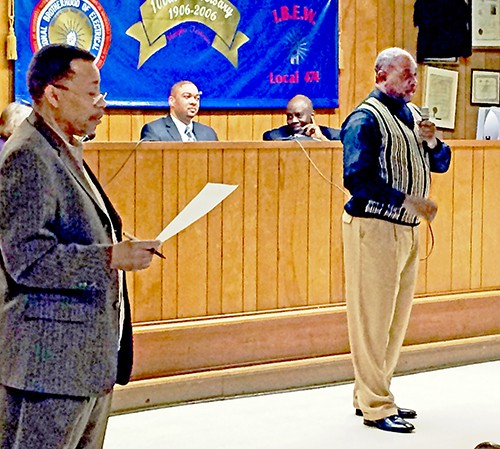As the second week of the New Year began, the aura of the holidays finally began to fade, and politics per se moved into high gear, locally, statewide, and nationally.
In Memphis, the city council stumbled over an early deadline that left a majority of applicants ineligible for a council vacancy, including a putative favorite, then recovered its balance with a fresh interpretation of the city charter by attorney Allan Wade that gave all seven hopefuls more time to complete their petitions.
In Nashville, the 2015 General Assembly convened to take on such key issues as health care, educational standards, changes in taxation, and legislation designed to exploit the constitutional changes effected by the state’s voters in the November 2014 election. In the cases of educational standards and “Insure Tennessee,” Governor Bill Haslam‘s proposal for Medicaid expansion, the trick will be to back into the essential structures of Common Core and the Affordable Care Act (ACA), respectively, with improvised Tennessee-specific substitutes.
Nationally, Tennessee’s two Republican U.S. Senators, Lamar Alexander and Bob Corker, attained new levels of influence as a consequence of the GOP’s capturing a majority in the Senate. Alexander became chairman of the Committee on Health, Education, Labor, and Pensions, and Corker ascended to the chairmanship of the Foreign Relations Committee.
Alexander, who is behind legislation to revise the Bush-era “No Child Left Behind” act, is widely regarded as a possible liaison between Republicans and Democrats in the highly fractionated Senate. Corker indicated, in a conference call with Tennessee reporters last week, that he intends to bring a new activist focus to what he regards as a drift in the Obama administration’s foreign policy. For that, he has been touted by columnist George Will as potentially “the senator who matters most in 2015,” though Corker has drawn more attention of late for his proposals to raise the federal gasoline tax.
• The city council imbroglio and subsequent fix stemmed from the revelation late last week that only former Councilmember Barbara Swearengen Holt Ware and local Democratic Party Chairman Bryan Carson had met what appeared to be the council’s deadline for filing a petition bearing 25 valid signatures of voters in District 7.
That would have meant that five others — including former interim Councilman Berlin Boyd, regarded in some circles as the favorite — could not vie for the right to succeed Lee Harris, now a state senator, in the vacated District 7 seat. Most of the five, including Boyd, were credited with 23 or 24 valid signatures — one or two short of the total needed — though all five had met the filing deadline of noon, last Thursday.
The situation was repaired with a hastily issued opinion from council attorney Allan Wade, who interpreted the city charter as giving additional flexibility on the deadline for submitting valid voter signatures. The new deadline was established by Wade as being Thursday, January 15th — a date that would seem to give the other candidates enough leeway to qualify.
Of the five, Boyd and Curtis Byrd Jr. had already submitted 23 signatures deemed valid by the Shelby County Election Commission (whose chairman, Robert Meyers, had noted that it was the council, not the commission, which had applied the signature requirement for regular elections to the instance of filling vacancies). Audrey Jones and David Pool had 24, and Charles Leslie had 15.
The council will choose a successor to Harris from among the ultimately eligible candidates next Tuesday, January 20th.
• At a farewell dinner last week for Harris, who was recently elected by his party colleagues in the Senate to be Democratic leader there, the new state senator got off a memorable quip: “Within this month, I’ll be drawing three government checks — from the city council, from the state Senate, and from the University of Memphis Law School. That proves I’m a Democrat!”
• The council does not lack for quipsters. Councilman Kemp Conrad, who was the host for a massively well-attended holiday party over the break, responded to someone’s suggestion that he might consult city planning czar Robert Lipscomb for help in building a parking garage to accommodate excess traffic. “A TDZ!” Conrad proposed.
• It would appear that the forthcoming session of the General Assembly in Nashville will not lack for controversy. The formal convening of the legislature, at noon on Tuesday, was preceded by a 10 a.m. “Women’s March on Nashville,” whose participants included another new state senator from Memphis, former Tennessee Regulatory Authority member Sara Kyle, who was elected in November to succeed her husband, Jim Kyle, now a Shelby County chancellor.
The rally was called to address several matters, including health, wage, and poverty issues, but a central concern of it was to counter a proliferation of bills in the legislature to impose new restrictions on abortion in the wake of the narrow passage of Amendment 1 by state voters in November.
Tennessee Right to Life, an organization that supports the proposed restrictions, indicated in advance that it had plans for a counter-demonstration.
Besides the abortion measures, other expected controversies include a renewed fight over proposed Common Core standards and efforts by several Republicans, including state Senator Brian Kelsey of Germantown, to abolish the Hall Income Tax in the face of resistance from Governor Haslam, who considers the potential loss to state revenues to be prohibitive.
But the major battle will take place in a session within the session. Haslam has called a special session, to begin on February 2nd, dealing with his “Insure Tennessee” proposal for accepting Medicaid expansion funds under the Affordable Care Act (aka Obamacare).
The governor’s plan, which apparently is assured of a waiver from the U.S. Department of Health and Human Services, provides for a two-track structure in which persons eligible under poverty-level guidelines could either accept vouchers to purchase private health insurance plans or come under TennCare, the state’s version of Medicaid, through acceptance of modest co-pays and premiums.
Funding could amount to as much as $2 billion annually, with the federal government absorbing the full costs for two years and 90 percent of them after that period. The state Hospital Association, which has been lobbying tirelessly for the Medicaid expansion funds, has indicated it would assist with the remaining financial obligation after the two-year period.
Haslam has made a special appeal to the General Assembly’s Democratic minority to help him pass enabling legislation for Insure Tennessee. A bill spearheaded by Kelsey and other opponents of Medicaid expansion to require legislative approval of any administration plan under the ACA was passed in the last General Assembly. And, though Senate Speaker Ron Ramsey has expressed a degree of open-mindedness, Senate Majority Leader Mark Norris of Collierville and several other GOP members seem reluctant to endorse Insure Tennessee.
The sentiment of six GOP legislators from Shelby County who addressed the Republican Women of Purpose group at Southwind TPC last week varied from lukewarm to defiantly opposed to the governor’s plan.
State Representative Curry Todd prophesied “a lot of blood-letting” in the special session regarding the plan; Kelsey insisted Republicans needed to “shrink the size of government, not … expand the size of government,” and cast doubt as to whether the federal government would or the state Hospital Association could pay its pledged share in two years’ time. State Representative Jim Coley lamented the plan’s “dependence on the federal government” and said he “hope[d] to persuade the governor this is not the most appropriate plan.”
State Representative Steve McManus said it might not be so easy to opt out of the plan after two years as Haslam suggests. He contends that the U.S. Department of Health and Human Services might withhold Medicaid funds entirely as retribution. “It’s like Hotel California,” he said, meaning that once you check into the plan, you can never leave.
 JB
JB 
